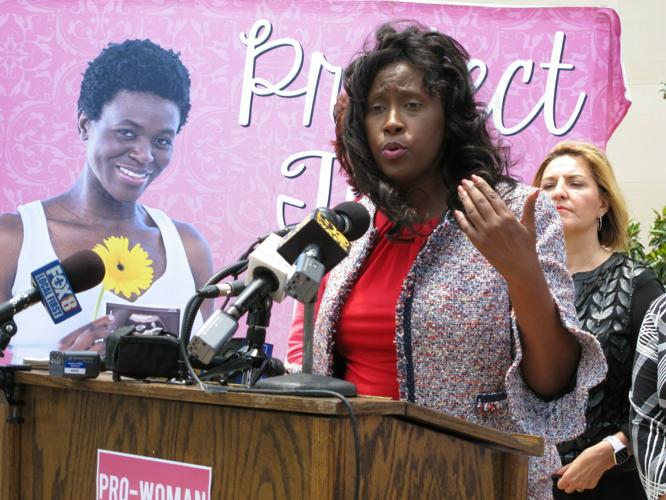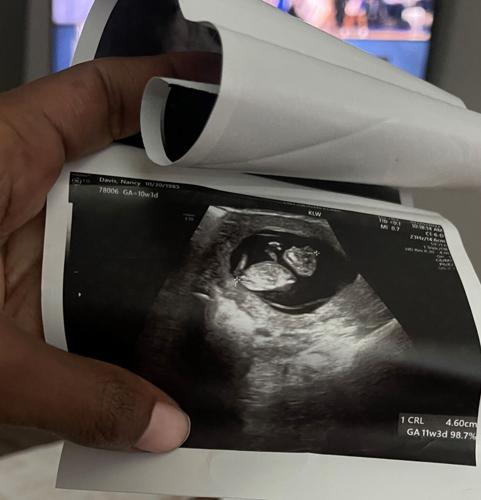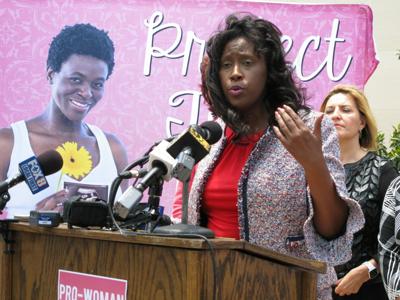After a Baton Rouge woman was denied an abortion for a fetus without a skull, state Sen. Katrina Jackson and 35 other lawmakers said the hospital “grossly misinterpreted” the state’s exceptions to the abortion ban in a statement released Tuesday afternoon.
“We are issuing this statement today to provide further clarity, although the law in conjunction with the emergency rule is very clear that this young lady is within the exception,” the statement read.
The pregnant woman, Nancy Davis, was denied an abortion after a 10-week ultrasound revealed a fetus with acrania, or lack of a skull. Doctors initially told her she would be able to get an abortion under the state’s list of “medically futile” conditions that allow for exceptions to the abortion ban, but the hospital later told her she would need to carry to term or go to Florida for an abortion.
The statement said the hospital is now correctly interpreting the law after Jackson, the law’s author, contacted the Louisiana Department of Health following media reports. The state then communicated with the hospital, according to the letter from lawmakers.
The facility, Woman’s Hospital, did not respond to questions about whether that means they are currently providing abortions for conditions like acrania.
“As medical providers, Woman’s Hospital stands by our mission to provide the best possible care for women in our community, and supports medical decisions made between a physician and their patient that comply with all state laws and policies,” spokesperson Caroline Isemann said in a statement.
The Louisiana Department of Health did not respond to questions about whether the hospital is now correctly interpreting the law.

An ultrasound image from Woman's Hospital shows Nancy Davis' fetus, at 10 weeks, developing without a skull. The hospital later denied her an abortion.
Despite clearly stating that Davis' pregnancy qualifies as an exception under the state's abortion ban, the statement from Jackson and the other lawmakers said that many who signed it share a faith that would “compel us to carry this child to term.”
Of the 36 who signed, 10 are female lawmakers. The lawmakers wrote that they believed the vital organs would form later in the pregnancy.
That is not how acrania progresses, according to medical experts. The skull does not form later, said Dr. Cecilia Gambala, a New Orleans-based maternal fetal medicine specialist who oversees high-risk pregnancies and complications.
Some patients do initially decide to carry a fetus without a skull to term. And some of those later make the decision to terminate.
“When they really start to show and they feel more movement, I've had women at that point, say, ‘OK, I'd like to deliver now,’” said Gambala.
If the patient decides to carry a baby without a skull to term, the team prepares for palliative care rather than newborn care.
“The pediatric team will have someone who'd assess the baby and do what they can to make them comfortable, if needed,” said Gambala. “They put a hat on the babies so that the parents don't have to look unless they want to.”
A lack of understanding of the prognosis of acrania highlights the challenges of practicing medicine within the constraints of a law written by politicians, many of whom do not have a medical background.
“Legislators who are not doctors should not be practicing medicine, but if they're going to they ought to have an understanding of the science of fetal development and fetal health,” said Dr. Rebekah Gee, an OB-GYN, CEO of Nest Health and former secretary of the Louisiana Department of Health.
The law was challenged in court by abortion providers, a student group and a family medicine doctor who said it was vague and unclear. Affidavits from a dozen medical providers said the vagueness of the law and the weight of criminal penalty would result in harm to patients. One doctor described a patient forced to deliver a non-viable fetus at 16 weeks. The patient had opted for a surgical procedure to remove the fetus, but the hospital’s legal team advised against it.
“Doctors in Louisiana warned about the negative impact these bans would have on pregnant patients — and that is unfortunately what is happening,” said Jenny Ma, senior staff attorney at the Center for Reproductive Rights, in a prepared statement. “We will absolutely see more and more situations like this if abortion remains banned in Louisiana and other states.”
After the abortion ban went in and out of effect multiple times as it moved through the courts, the Louisiana Supreme Court declined an appeal from abortion providers to block a ban on Aug. 1. The law had been in effect for one day when Nancy Davis was given the acrania diagnosis. Doctors originally directed her to the Baton Rouge abortion clinic, but it was closed.
Davis plans to travel to North Carolina for an abortion with financial assistance from donors, who have given more than $25,000 on the crowdfunding platform GoFundMe.




